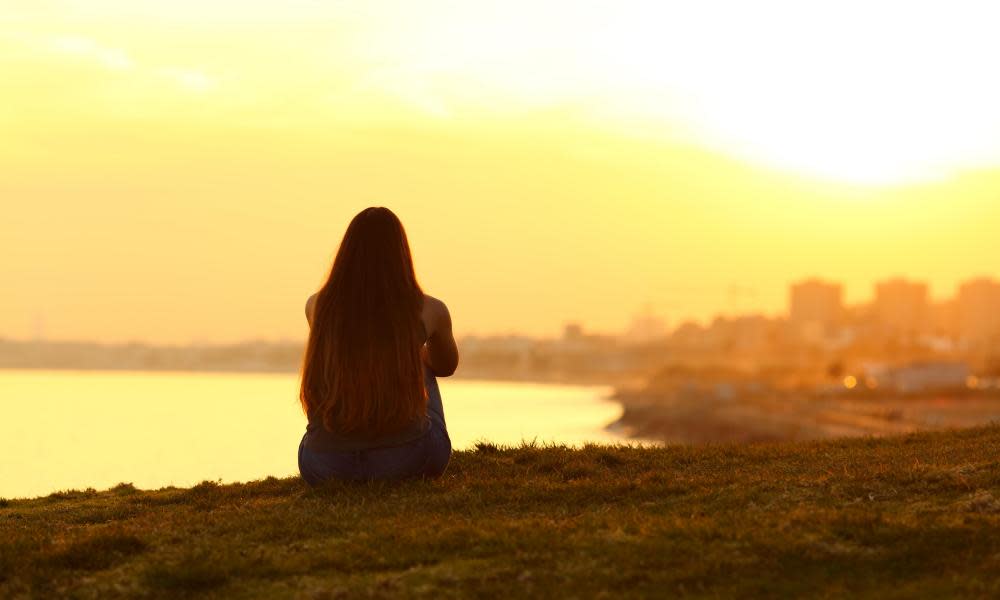How will we tackle the pandemic of loneliness after Covid?

It was New Year’s Eve going into 2020, and I was in a pub in Castlemaine with my friend Stu Speirs.
“What word sums up most for what you want from the year?” I asked him.
“Community,” he said, without hesitation. “A rebellion against this day and age’s individualism and individual interest. And instead an interdependence on others – and a sense of interconnectedness.”
This was all very articulate for 1am on New Year’s Eve but Stu had been thinking about this a lot. He works in event management for small communities around Australia. With the destructive fire season, he saw that it was more important than ever for people to come together and build community.
Related: Please check in on your introvert friends. We might not be doing as well as you think | Arwa Mahdawi
Of course no one saw what was coming for us, and how prescient the importance of community would turn out to be – but also how tested it would be by the pandemic. Obeying lockdown rules and public health orders that emphasise taking collective action, can strengthen social cohesion and limit the spread of the virus. But the nature of this collective action – isolating ourselves – seems like a cruel cosmic joke. Lockdowns, social distancing, limits on gatherings, cancellation of community sport and live music and the shutdown of public spaces means we are kept away from each other. This can result in difficulty forming and maintaining the very social bonds and resultant community spirit that will get us through the pandemic and allow us to bounce back quicker.
Right now we exist in a space filled with tension – we’re desperate to connect but prevented from doing so for our own good, and the good of others.
Add in masks, which makes it difficult to “read” faces and a general fear of contagion, further disincentivising mingling – and you have the recipe for a second pandemic.
This is the pandemic of loneliness, which was already worrying governments, scientists and health professionals long before the virus arrived. Numerous studies have found loneliness is associated with a range of health problems – from addiction to depression to heart disease – and shorter life expectancy.
In her new book The Lonely Century, London-based economist Noreena Hertz charts the pervasiveness of loneliness in the 21st century.
Three in five US adults describe themselves as lonely, while in the UK, one in eight British people said they didn’t have any close friends.
In Australia those living in cities have fewer friendships and neighbourhood connections than they did 20 years ago, according to a 2016 report by the Grattan Institute.
Hertz traces the start of this particular modern strain of loneliness to the rise of neoliberalism.
This ideology “prized an idealised form of self-reliance, small government and a brutally competitive mindset that placed self-interest above community and the collective good,” she writes.
Related: End of the office: the quiet, grinding loneliness of working from home
Then there are advances that make life more seamless – and ostensibly connected – but actually displace established communities and create circumstances that make it harder to form social bonds.
Technology, including smartphones, have created what Hertz terms “digital privacy bubbles”, where we might be physically in a crowded place, such as on public transport, but we’re effectively separate and in our own world, shut out from the sounds and signs of those around us.
Airbnb displaces entrenched populations and creates a churn of short-term tenants.
Contactless payment, self-serve checkouts and online shopping remove us from micro-interactions, such as small talk with a cashier.
And online dating apps have replaced real-life flirtation, courtships and meeting potential partners “out in the wild”.
“Our culture of self-reliance and hustle, so valourised by neoliberal capitalism comes at significant cost,” writes Hertz.
After this prolonged period of isolation, the sudden shock of new social distancing and lockdown measures, how do we recover from the loneliness that might have set in?
Once there is a vaccine, there is a chance for society to have a hard reset – and bake community-building and the alleviation of loneliness into government policy and individual action.
We can – and need to – throw everything at this problem once we open back up again. It means government investing in public spaces, such as libraries, parks and gardens and public squares. It means planners and architects designing apartments and workplaces around common areas and shared facilities that encourage serendipitous encounters.
It means, on an individual level, making an effort to connect with others in real life, the same way you would make an effort to stick to, say, an exercise plan.
With technology increasingly driving us away from real-life encounters, deliberate steps must be made to drive ourselves back to each other.
This week I spoke to my pal Stu again, in lockdown in Melbourne. How has his thinking on community changed since New Year’s Eve?
“I think the optimistic view is that the virus shows we are all reliant on others – and we are all interconnected,” he said. “I am hoping that the realisation of our interconnectedness will strengthen communities as we come out of lockdown.”
Stu told me about an event he went to in Pambula in February – after the fires had been through.
“The community had a big hug -in on the main street – everyone just came together for a massive hug. They all needed a sense of community bonding and community healing. When this is over [the pandemic] there will be a collective grief that we’ll share when we’re able to gather in numbers – and that’s what community is – it’s the sharing of grief, burden, joy.”


